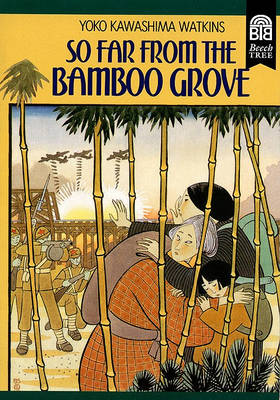This book needs to be placed back on the shelf.
Yoko Watkins gives us a fictionalized account of her family's escape from North Korea at the end of World War II. However, she narrowly limits the historical setting and plot to avoid the moral issues surrounding her family's presence in Korea in the first place. Her family was in Korea as part of the Japanese imperial drive to conquer of Korea, China, the Pacific and even the western US. They were driven by a race based state religion that saw the Japanese Emperor as being a god and the Japanese as being a superior race destined to rule the world. We may never know the exact extent of Yoko's family's direct or indirect involvement in Japanese war atrocities but this context of history and morality must not be ignored.
Living in North Korea, Yoko's father worked to enforce Japanese imperialist plans of carrying out cultural genocide (http://www.cgs.c.u-tokyo.ac.jp/workshops_e/w_2004_02_23_e.html) through attempted eradication of Korean language, history, and forced adoption ofJapanese names, etc.. According to R.J. Rummel's “Statistics of Democide: Genocide and Mass Murder Since 1990”, 5.4 million Koreans were conscripted into forced labor and shipped all over Russia, China, Japan. Hundreds of thousands, if not millions, died under murderous working conditions and untold millions were never repatriated. Their descendants still live in remote areas of Russia, China and constitute the largest minority population in Japan living through what the UN Human Rights Rapporteur described as "deep and profound racism" (http://news.bbc.co.uk/2/hi/asia-pacific/4671687.stm). The Japanese also conscripted an estimated 100,00 to 200,000 teenage girls and women into forced sexual slavery for its military (http://www.nytimes.com/1995/04/06/news/06iht-book_4.html?scp=9&sq=comfort%20women&st=cse).
Manchuria, where Yoko's father worked, was the location of Unit 731 where innocent Korean and Chinese civilians were used to conduct medical experiments. Vivasections were performed on men and even pregnant women without anesthesia. Biological weapons were tested on human subjects. These weapons were even used on the US (http://www.nytimes.com/2000/12/21/world/japanese-veteran-testifies-in-war-atrocity-lawsuit.html?scp=5&sq=unit%20731&st=nyt&pagewanted=all, http://www.nytimes.com/1995/03/18/opinion/the-crimes-of-unit-731.html?pagewanted=1).
While Yoko herself may be a victim of history, a retelling of her story that ignores these historical and moral issues is a distortion of historical reality and morally irresponsible. We cannot be lulled into false naivety by being enamored by just the well-written narrative. This book is morally analogous to an escape story of a Nazi administrator's family living in Birkenow-Auschwitz trying to return to Germany while freed Jews and Poles exact cruel revenge on innocent Nazi families.
If a hypothetical book told this story from a Nazi family's perspective in a sympathetic and compelling way, should it be taught to middle school children? Such a proposal would only be imaginable if there were grave, serious deliberations about all relevant social, historical, moral issues surrounding the book and a clear driving educational purpose. The suggestion should be rejected outright if the historical and moral context of Nazi atrocities was simply ignored, poorly known or even whitewashed.
Similar considerations MUST be had with Yoko Watkins' book! Teaching such material to our children without proper awareness, let alone a deep and profound understanding, is a distortion of history and inexcusable moral irresponsibility. The fact that Yoko Watkins' book is being taught as a heroic escape narrative is born out of a lack of requisite understanding of East Asian history. Including this book as requisite reading for children or even giving this author the honor of speaking to our children is a sad perpetuation of this travesty.
There are no bamboo groves in the region of Korea where Yoko Watkins lived. There were no communist soldiers in North Korea. Repatriation of Japanese families occurred under military protection (http://web.archive.org/web/20070214033854/http://issue.media.daum.net/yokostory/200701/18/yonhap/v15423403.html). If there's anything to be salvaged from the tragedies of wars is for humanity to learn its past mistakes. This book can only portray Yoko and her family in a protagonist light by side stepping the history and morality behind her story. These are very things that should not be ignored from history.
If the full truth and proper treatment of Yoko Watkins' real story cannot be properly conveyed to middle school children, teaching of her book should also be reconsidered. There are far richer and valuable books out there that can be taught in place of Yoko Watkins' book. There is no reason to tread on immorally ground on the side of war atrocities and create the possibility of hurting Korean-American families.
- ISBN10 0833526634
- ISBN13 9780833526632
- Publish Date 12 August 2008 (first published 1 May 1986)
- Publish Status Out of Print
- Out of Print 7 April 2021
- Publish Country US
- Imprint Turtleback Books
- Edition Bound for Schools & Libraries ed.
- Format Hardcover (Library Binding)
- Pages 192
- Language English
